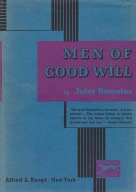Jules Romains, ‘Men of Goodwill’ is the longest novel ever, running to twenty-seven (27) titles. Yes, 27! They have all but disappeared. Few libraries have the whole set, and finding a set to purchase was a long chase for me. They appeared in an English translation in the 1930s. Each volume contains two novels, apart from the last.
In this, volume 1, there are two novels: ‘The Sixth of October’ and ‘Quinette’s Crime.’

Romains’s description at the start of Paris awakening, stirring, moving on a working day is wonderful. He was a believer in some kind of collective consciousness in crowds and he sees this in patterns, recurrences, and actions and reactions on streets, in the Metro, on buses, in employees clocking in, bicycle riders at a traffic light, trucks backing into loading docks at les Grand Magazins.
Monsieur Quinette spontaneously hides a murderer and involves himself in the crime for no other reason than boredom, and because he is, he thinks, so much smarter than anyone else. He misleads the police, extracts the dosh, but finds Leheuday, the murderer, a thug and a loose cannon. He decides to off Leheuday, nick the dosh, and perhaps take Leheuday’s rather dim girlfriend, while leading the police on a merry dance. Deciding is slow work and his last scenes with Leheuday are interminable. But in the end, bang, bang, and he is dead.
It takes Quinette both volumes to shoot Leheudey who murdered an old women in the opening pages. In another of the several threads started in these opening volumes, the students Jallez and Jerphanion meet and they continue through the remaining volumes I think.
Jalllez and Jerphanion become friends, and the Minister of State Gurau discovers a plot against him. He is another who thinks he is smarter than those around him.
The street scenes are well described. The interior monologues of Quinette and Gurau are well done but they go on too long.
 Jules Romains, who broadcast for De Gaulle from New York.
Jules Romains, who broadcast for De Gaulle from New York.
The whole 27 volumes together comprise an encyclopaedia of Parisienne life — the high and the low. It reads rather like an encyclopdia, earnest, accurate, detailed, and bloodless. Still the characters are differentiated in manner and speech as part of the ethnography of types and the descriptions of Paris are cinemagraphic.
Skip to content
